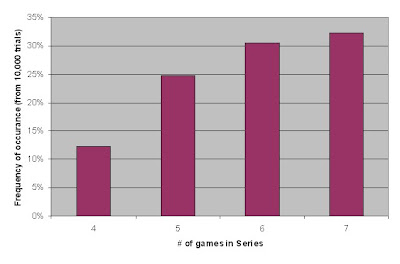We can simulate a World Series by choosing a probability of winning a game, 50% seems a fair starting point, and then counting games. Once a team wins four games, perform no further game simulations for that series. Simulating 10,000 series allows the collection of some statistics and probabilities. For instance, the number of games in a series if the games are a toss up (one team wins 50% of the time) is shown in the chart below.
 The exact result for how many games will occur in a World Series if each team wins 50% of the time is 4 games 1/8 of the time, 5 games 1/4 of the time and 6 and 7 games 5/16 of the time for both. This is a good check on our simulation.
The exact result for how many games will occur in a World Series if each team wins 50% of the time is 4 games 1/8 of the time, 5 games 1/4 of the time and 6 and 7 games 5/16 of the time for both. This is a good check on our simulation.The results from 100 years of World Series (including only best of seven series) closely parallels the simulations, with four game series slightly more common.
 To answer the first question, 10,000 trials shows that if the games are a toss up the winner of the first game goes on to win the World Series 65.6% of the time. A glance back at almost 100 years of World Series, (eliminating ones that were not best of seven, and using wikipedia to see which team won first), shows that historically the first team to win wins the series 66% of the time. Perhaps that stat from Fox isn't so surprising.
To answer the first question, 10,000 trials shows that if the games are a toss up the winner of the first game goes on to win the World Series 65.6% of the time. A glance back at almost 100 years of World Series, (eliminating ones that were not best of seven, and using wikipedia to see which team won first), shows that historically the first team to win wins the series 66% of the time. Perhaps that stat from Fox isn't so surprising.Varying the probability that one team (say the National League team) wins from 50% lets the simulation explore the probability that the first team to win a game wins the series. Obviously if one team wins 100% of the time, they win the first game and the series. This is also the same as if one team wins 0% of the time, the other team wins the first game and the series. The middle result (50% probability of winning a game), reported above, is 65.6%. The plot below shows how this varies with the probability of the National League team winning. Given that the historical result is that the first team to win a game in the World Series wins the Series 66% of the time, it is reasonable to expect that the chance one or the other team would win a given World series game is close to 50%, or at least somewhere between 40% and 60%.
 Finally the simulation reveals the number of games played, the series winner and the winner of the first game. The plot below shows that histogram.
Finally the simulation reveals the number of games played, the series winner and the winner of the first game. The plot below shows that histogram.
Because the simulation is only 10,000 trials, the results here are probably plus or minus 0.5%.
No comments:
Post a Comment